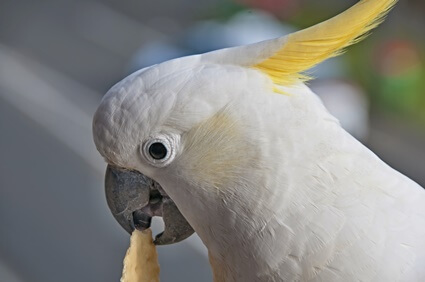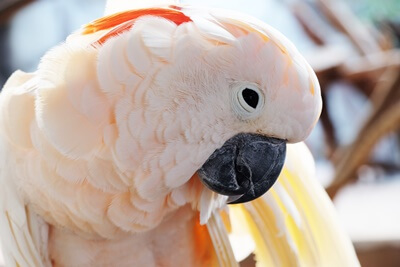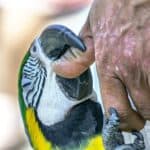Last Updated on March 10, 2024 by Carrie Stephens
If you scrutinize the lower mandible of a cockatoo, you’ll notice that the “U-shape” is absent. When a cockatoo delivers a bite, the beak has three attack points, creating significant force.
The bite force of a cockatoo is between 250 and 350 pounds per square inch (PSI.) That’s insufficient to sever a human finger. Even so, a cockatoo’s bite may cause cuts, bruises, bleeding, and bone fractures.
Cockatoos (Cacatuidae) can be very nippy, especially when young. They’re emotional birds that demand attention. If they aren’t given enough time, a cockatoo may vent its frustrations with its beak.
Cockatoo Bite Types
There are three types of cockatoo bites:
| Puncturing bites: | A cockatoo will sink the sharp edge of its beak into your skin before backing away. This will be a short, sharp shock but can cause bleeding and infection. |
| Twisted bites: | The cockatoo will bite harder, keep its beak locked around the bite area, and twist the skin. This bite can inflict significant pain. |
| Long bites: | A cockatoo will bite down as hard as possible and hold on, refusing to release. This bite can cause severe damage, possibly fracturing a bone. |
Why Cockatoos Bite People
A cockatoo will have a reason for biting, though you may not always understand why it’s upset.
The most common reasons include:
- The cockatoo doesn’t want to be handled.
- You haven’t given the cockatoo enough attention, so it bites to get a reaction.
- The cockatoo is jealous of other birds or humans.
- Something has spooked it. This could be a brightly-colored shirt, a noise you make, or something you carry. A range of innocuous things can act as triggers.
- Hormones are elevated. The cockatoo may be bluffing (the avian equivalent of puberty,) or a mature cockatoo may be frustrated during the breeding season.
- The cockatoo is overstimulated by excessive noise, light, or activity.
- You’re not providing an appropriate lifestyle, leading to stereotypies (repetitive actions).
Young cockatoos may lightly nip to show love and affection toward a much-loved owner.

Signs A Cockatoo Is Going To Bite
As cockatoos have crests atop their heads, owners are warned if the bird feels annoyed. If the crest is flat against its head, approach it cautiously, avoiding sudden noises and movements.
Note if a cockatoo drops its wings, opens and closes its beak, and lunges or walks purposely toward you. It’s likely to bite with force as you’re deemed to have ignored its other warnings.
Bite Force of A Cockatoo
The bite force of animals is measured in pounds per square inch (PSI). When angry or upset, a cockatoo can bite with a PSI of 250 to 350. This is almost equivalent to a husky’s jaws.
Cockatoo Bites Hurt A Lot
If a cockatoo bites, it’s sending an unmistakable message that you must stop something you’re doing. It may issue a less forceful bite as a warning, only escalating to maximum bite force as a last resort.
A cockatoo’s bite can be excruciating due to the unique anatomy of the beak. The lower mandible has two prongs that, combined with the upper beak, create a three-way bite.
Moluccan cockatoos issue particularly painful bites because they’re bigger, stockier birds.
Cockatoo Can’t Bite Your Finger Off
A bite force of 350 PSI is insufficient to rip off a human finger from an adult human. It’s still strong enough to crack or break a bone, especially that of a young child.
Some people consider cockatoo bites worse than macaw bites because they bite more frequently and are likelier to do so with maximum force. However, macaws bite with more force than cockatoos.
Risks of A Cockatoo Bite
There are risks associated with bites from cockatoos:
Bleeding
Cockatoos have sharp beaks that may break the skin when biting a human finger or hand.
Bites to the ear or lips are likelier to bleed profusely. A bandage or band-aid must be used to stem the bleeding caused by a cockatoo bite.
Apply pressure, especially if the wound appears deep. If the bleeding continues for 10 minutes or longer, seek medical attention because you may need stitches.
Infection
If a cockatoo bites hard enough to draw blood, it may result in infection. The mouth is a breeding ground for bacterial microbes, so it’s possible to get zoonotic diseases.
Infectious Diseases in Clinical Practice details a case involving a severe cockatoo bite infection revolving around Mycobacterium chelonae to an immunocompromised individual.
Psittacosis is a concern for anyone bitten by a cockatoo. Hand stated that up to 40% of pet birds carry the psittacosis virus, sometimes asymptomatically, manifesting as flu-like symptoms in humans.
Tetanus (lockjaw) is a risk if a cockatoo bites you. If you haven’t had a tetanus shot in the last 10 years, you may experience a cramping jaw, muscular stiffness, spasms, and seizures.
Broken Bones
It’s rare for a cockatoo to exert enough pressure to fracture a human finger, but it’s possible. A cockatoo’s beak can wrap around a finger, so fractures can occur if it refuses to relinquish its grip.

What To Do if A Cockatoo Bites You
You’ll be in shock, but remain calm and avoid reacting adversely. This sense of calmness makes it likelier that the cockatoo will release its grip sooner.
Return the cockatoo to its cage without reacting all the while. Don’t make the cockatoo feel like it is being punished for biting because this will only cause further aggravation.
Inspect the area where you were bitten. Wash the wound with antibacterial soap and stem any bleeding. If the injured area continues to throb, turn red, swell, or ooze pus, seek medical advice.
Parrots can hold a grudge, so you may need to rebuild your bond. Food and attention will go a long way to making things right, but you’ll also need to show patience.
Taming A Nippy Cockatoo
Cockatoos are more likely to bite than other parrots, so you must train them to avoid this behavior. Do all you can not to respond, as it serves as a form of attention.
Spend time with the cockatoo so they feel happy and contented with life. If a cockatoo still bites occasionally, consider other explanations. Reasons for biting include:
- Small cage. The cockatoo’s cage is too small to extend its wings and move around.
- Overstimulation. Move the cage to a quieter area with less footfall and noise.
- Hormonal. Reduce the amount of direct sunlight and be mindful of where you stroke your bird.
Reinforce good behavior with treats and praise when your cockatoo behaves well. Clicker training enables a cockatoo to anticipate a reward and distract it if it grows frustrated or annoyed.





